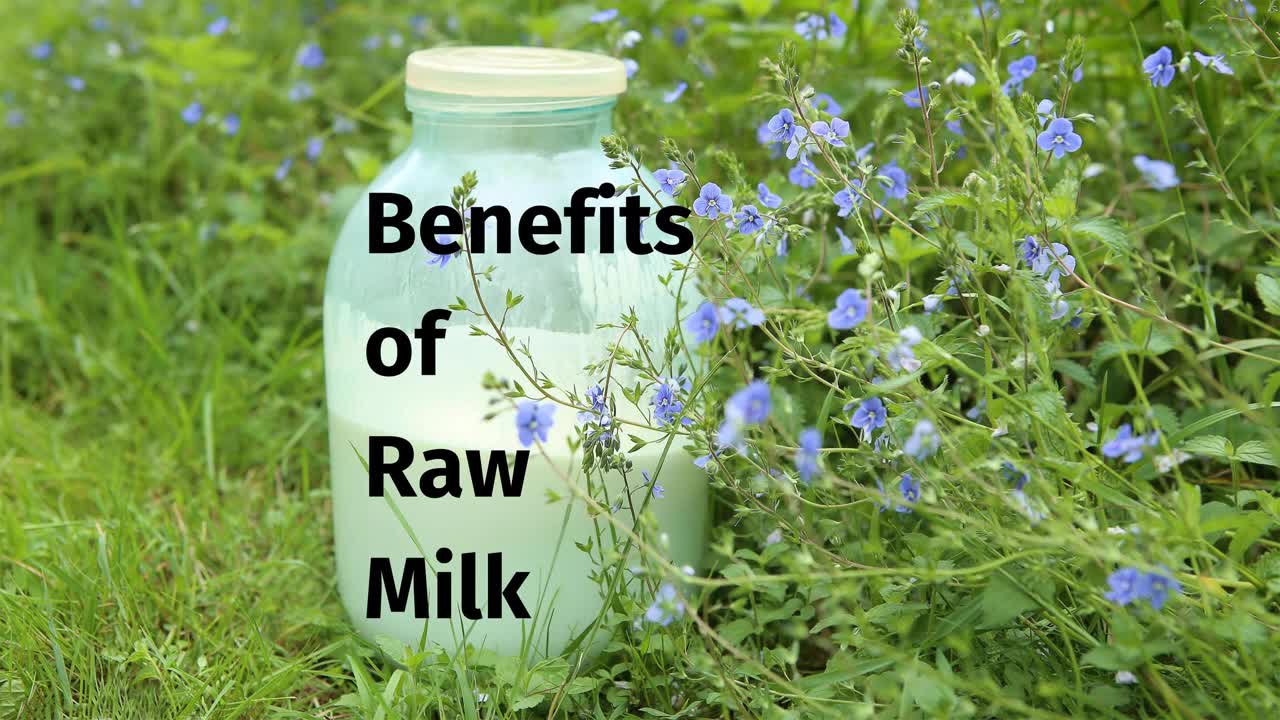Premium Only Content

Benefits of Raw Milk
Last time it was all about whether raw milk is safe and this week it’s about the benefits of raw milk. There are quite a few, though I only need one. Taste is the one for me. But as I said, there are lots of benefits of raw milk.
Before I get into our homestead updates, I want to take a minute and say welcome to all the new listeners and welcome back to the veteran homestead-loving regulars who stop by the FarmCast every episode. I appreciate you all so much. And if you love this content, the best thing you can do to help us in getting the word out is to share, share, share it on all of your social media. There is so much talk today of whose voice might be throttled. But I’m here to tell you that when you share content that you like, there is no way for anyone to silence it.
Onward. I’m so excited to share with YOU what’s going on at the farm this week, the benefits of raw milk and a recipe for vanilla cream cheesecake fat bombs.
Today’s Show
• Homestead Life Updates
• Benefits of Raw Milk
• Vanilla Cream Cheesecake Fat Bombs
Homestead Life Updates
It’s fall here in the Blue Ridge Mountains. The leaves reached their peak last week. Today the ground is covered with the nourishing foliage that has fallen to return nutrients to the land, providing the next year’s food for each and every plant and tree. It is the absolute best time of year. Tourists come from all over the world to visit our little place of heaven on Earth at this time each year.
Cows
We are still waiting on our new calf. It is still obvious she is pregnant, but the signs of imminent birth are still lacking. It’s an adventure every day waiting on her udder to fill up to bursting. Even then it can be a week or more before that calf appears. I’m praying for a heifer. That’s a girl for you city-folk. We always want girls. They are either added to our herd of beauties or sold to another farm to increase their herd. Bulls are sold to others as well, but we still prefer the option of adding to the herd. On a homestead, one bull may be one too many.
In the future we will be breeding all of our girls via artificial insemination with sexed semen. It gives us much greater control of our genetics. We want heifers and we want cows that have A2A2 genetics. If you are not familiar with that I refer you to my podcast on “What is A2A2 Milk?”. Link in the show notes.
Other Livestock
The sheep, goats, and donkeys have wonderful winter coats. They look ready for the winter. The goat girls in particular look fat and sassy. We still have grass for them, but hay is standing by when they finish eating all of the summer grass. It’s kind of like hay still standing in the field that was never baled and there is some green grass. They have variety in their diet right now with the tall dried stuff and the fresh green stuff lower down as their dessert.
Quail
The quail are still not laying any eggs to speak of, but that may change in the next week or so. Scott changed the setup of the lights. Still it takes a week, 10 days or even longer to produce an egg. We shall see. The new babies – who are no longer babies – will be going outside in the next few days. They are fully feathered and we have turned off their warming lamp. So far all is good. They are hardy and will adapt to the cooler temps just fine.
Creamery
Please follow us on Facebook to see the pictorial view of the creamery. In less than 2 weeks, weather permitting, the rest of the inside walls should be complete. Isn’t that amazing. It seems like only last month that I was walking around our there with no walls at all. Now I can clearly experience each and every room.
On with today’s topic, the Benefits of Raw Milk.
Benefits of Raw Milk
Last time I talked about the dangers and time I want to talk about the benefits of raw milk. There are dangers in consuming any food. However, as small as the risk of drinking raw milk is, we still need to answer the question: why take the risk? What benefits does raw milk have over pasteurized milk that have convinced so many people in the US and around the world to actively seek it out?
Why drink raw milk in the first place? Today I will cover a variety of reasons. Different people will resonate with different reasons, depending on their value system, worldview and priorities. Here are the highlights:
• Raw Milk Nutrition
• Lactose Tolerance
• Overall Health
• Flavor
• Community
• Environment
• Ethics
That’s quite the list so let’s get started.
Raw Milk Nutrition
Many consumers believe that raw milk is higher in nutritional content than conventional milk, which may have some merit. This is especially true when applied to operations such as ours which are very small and pasture-based. Our cows graze every day, all day on grass or stored and preserved grass called hay.
There is evidence that milk from grass-fed cows is likely to have higher levels of fat-soluble vitamins and other nutrients. Grass-fed cow products have been shown to have higher levels of conjugated linoleic acid (CLA) and essential fatty acids in their milk. CLA is important because it helps your body build muscle rather than store fat and has anti-inflammatory properties. The best natural sources of CLA are grass-fed beef, butter and full-fat dairy products such as cheese and yogurt. Here is a quote from a study published in 2006 titled “Modifying milk composition through forage” (Link in the show notes.)
“The fatty acid (FA) composition of cows milk has become less favorable to human health in the last four decades due to changed feeding and management practices, notably higher proportions of concentrates and silages in diets with less grazing.”
Another quote from this abstract is quite interesting to small farmers like myself. There are financial benefits when you produce a superior product.
“Farmers from some dairy cooperatives in The Netherlands that produce milk from grazed grass now receive a premium payment in addition to the base milk price, so that primary producers can benefit from the higher market value at the end of the production chain.”
On that note, I’ll include another link from a paper published by the National Institutes of Health, “Conjugated linoleic acid content of milk from cows fed different diets.”
The pasteurization process also reduces the nutritional quality of milk products. Research has shown a decrease in manganese, copper, and iron after heat treatment. The FDA acknowledges that pasteurization destroys a substantial portion of the vitamin C in milk, and sterilization via pasteurization is also known to significantly impair the bioactivity of the vitamin B6 contained in fresh, raw milk. Beta-lactoglobulin is a heat-sensitive protein found in milk. It is destroyed by pasteurization. Why is it important? It increases absorption of vitamin A. The bottom line is that the supplemental vitamin A added to conventional milk may be harder to absorb.
Lactose Tolerance
Many people experience digestive and other problems when they consume pasteurized milk, but have no trouble with raw milk. There is no one answer as to why this is the case. The FDA insists that unpasteurized milk has no probiotic effect or any other characteristic that could explain this phenomenon. But the collective experience of raw milk consumers suggests otherwise. The Weston A. Price Foundation conducted an informal survey of over 700 families, and determined that over eighty percent of those diagnosed with lactose intolerance no longer suffer from symptoms after switching to raw milk. The “Lactose Intolerance Survey” was published in March 2008 (Link in show notes.)
It's hard to make decisions these days. The Weston A Price Survey included over 700 families and I don’t know how many total people. They say “Yay”. Stanford University performed a clinical study to help determine whether raw milk reduces the incidence of lactose intolerance. They had a whopping 16 people in their “study” which said no difference in symptom severity between pasteurized and unpasteurized milk. I found it hilarious that they included soy “milk” in their study and found no lactose intolerance symptoms in that part of the study. UMMMM Let me see. Perhaps that’s because soy is a bean and not milk, therefore no lactose involved and no lactose intolerance. Anyway, I laugh at these “studies” that are produced these days. But you will be told that you must believe the science.
Health
There is substantial epidemiological evidence from studies in Europe that consumption of raw milk during childhood may protect against asthma, allergies and other immune-mediated diseases.
A large cross-sectional study demonstrated a significant inverse association between “farm milk” consumption and childhood asthma, rhinoconjunctivitis, sensitization to pollen and other allergens. That study “Inverse association of farm milk consumption with asthma and allergy in rural and suburban populations across Europe” is also found on the National Institutes of Health website, link in the show notes. While we must always remember that correlation does not prove causation, the findings were consistent across children from farming and non-farming environments, indicating that farm milk consumption may have had an independent effect on allergy development.
Flavor
Many people think that raw milk has a better flavor and texture in comparison to pasteurized, homogenized milk. The words “fresh”, “real”, “alive” and “rich” are often used to describe it. There also exists a subtle shift in flavor of the milk through the seasons as the grasses change. Consumer research demonstrates that flavor is one of the top reasons that consumers choose raw milk whenever possible.
I’m sure those of you who drink raw milk can attest to the significant flavor differences between raw, fresh from the cow and the store-bought stuff. While flavor alone is not reason enough for choosing raw milk, it is clearly a driving force in my decisions and perhaps yours as well.
Community
Raw milk is almost exclusively produced by local farmers. A growing segment of the population is choosing to support local, family farms and businesses over multi-national conglomerates. In Virginia, we support it by actually buying stock in the farm. Literally, buying part of the herd.
Our herd share owners are reconnected with their food supply. They are stimulating the local economy and promoting sustainable farming practices.
Environment
Similar to above, consuming milk that is produced by local farmers using sustainable methods has far less of an environmental impact than drinking milk produced in large confinement feeding operations thousands of miles away. Conventional dairy operations are highly destructive to the environment. Air and water pollution from dust and feedlot manure, plus fertilizers and pesticides used in grain production, are damaging to the environment and to the health of farmers, farm workers, and nearby residents. Manure runoff into water can cause the death of aquatic life, as well as contamination of drinking water by nitrate, harmful microorganisms, and antibiotics and hormones.
Raising dairy cows on well-managed pastures decreases soil erosion, increases soil fertility, and improves water quality due to decreased pollution. Cows grazing on pasture reduce the energy needed to grow large acreages of grains. Large-scale, confinement dairy operations are energy intensive.
Ethics
Cows that live on small farms and spend their days on green pasture live a happier and healthier life than those that live in overcrowded and inhumane “factory farm” conditions. This is important to those of us that care how animals are treated. When confined in small spaces under stressful conditions, cows often become ill and are treated with large quantities of antibiotics. Pasture-raised cows have longer lifespans than conventionally raised cows, as corn-based diets contribute to health problems, and breeding practices designed to maximize milk production have caused reproductive problems. Our Normande cows and bulls are often sought out by dairy farmers looking to improve the depleted genetics of their herds.
As far as I know we have never sold any of our livestock to a conventional dairy. There are plenty of horror stories and disturbing videos that portray the inhumane treatment of cows in conventional dairy operations. Working with our small farm or one in your area assures you, the compassionate consumer, that the animals are properly treated.
Putting It All Together
Any one of these reasons might be enough justification for choosing raw milk for a given individual or family. But when viewed together, it’s easy to understand why raw milk consumption has increased so significantly over the last two decades. Consuming unpasteurized milk and dairy products has several positive benefits that, for many people, far outweigh the possible risks. As I have said often, you must consider both the positive and negative qualities of raw milk consumption when making the decision for you and your family.
Please let me know if you have questions. On to our recipe of the day.
Vanilla Cream Cheesecake Fat Bombs
Those living the Keto lifestyle will understand what I just said. For those of you unfamiliar, living the keto lifestyle involves getting your body into ketosis and keeping it there. When you body is in a state of ketosis, you burn fat for fuel instead of carbohydrates. It completely alters your reality around food. Carb burners are constantly looking for and planning their next food fix. Keto fat burners may only eat once or twice a day and never think about food between meals. It can be quite freeing mentally. So much of my time used to be wrapped up in thinking about food. Now it is more of a bother.
Having said that, we do want to plan ahead so that when that urge to eat finally does hit, we can get something quick and then get back to doing other things with our lives. This recipe will help with that.
These delicious vanilla cheesecake fat bombs are high on taste and will give you a long-lasting boost of energy. They are deliciously creamy and taste just like cheesecake.
A word of caution to anyone not living the keto lifestyle. If you are primarily burning carbohydrates and just add a lot fat such as in these luscious fat bombs, you will not induce ketosis and you will likely put on weight. There is a science to it. Ketosis first, then fat bombs for fun.
What You Need
• 8 oz cream cheese, softened
• 2 teaspoons vanilla extract
• 2 oz erythritol (or other no carb sweetener of choice)
• 1 cup heavy whipping cream
What To Do
1. Add cream cheese, vanilla and sweetener together in a mixing bowl. Mix on low speed for 2 minutes or until you reach a smooth consistent texture.
2. Add half the heavy whipping cream and mix for another 2 minutes. Let the mixture sit for 3-5 minutes to allow the erythritol time to dissolve.
3. Add the other half of the heavy whipping cream and mix on medium speed for 3 minutes or until the mixture is thick with firm peaks.
4. Gently spoon mixture into molds of your choice. Set in the fridge for at least 1 hour.
Notes
Suggested molds: mini cupcake pan with liners or 2 oz acrylic soap molds. The cupcake method with liners is much less messy.
Final Thoughts
That’s it for today’s podcast on the benefits of raw milk. I hope you enjoyed learning more about our homestead and our wonderful animals. I can’t tell you what a joy it is for us every single day as we go about living the sustainable life in the beautiful Blue Ridge Mountains. We love sharing it all with you.
Let me know why you do or do not drink raw milk. And feel free to ask questions if you haven’t decided and would like more information. I’m always happy to help in any way that I can. If you are like me then you don’t trust much coming out of today’s industrial food systems. As much as possible I raise my own and buy what I don’t produce from those that I trust. Visit us at the farmer’s market in Wytheville, Virginia. Get to know us and the other producers in the area. Find out why and how we do what we do. Ask questions and get to know all of us personally. We’d love to meet you.
If you enjoyed this podcast, please hop over to Apple Podcasts, SUBSCRIBE and give me a 5-star rating and review. Also, please share it with any friends or family who might be interested in this type of content.
As always, I’m here to help you “taste the traditional touch.”
Thank you so much for stopping by the homestead and until next time, may God fill your life with grace and peace.
References
• Science Direct: Modifying milk composition through forage
• National Institutes of Health: Conjugated linoleic acid content of milk from cows fed different diets.
• Weston A Price: Lactose Intolerance Survey
• National Institutes of Health: Inverse association of farm milk consumption with asthma and allergy in rural and suburban populations across Europe
Recipe Link
Vanilla Cream Cheesecake Fat Bombs
To share your thoughts:
• Leave a comment on our Facebook Page
• Share this show on Twitter, Facebook, Instagram and all of your social media
To help the show:
• PLEASE LEAVE A REVIEW for Peaceful Heart FarmCast on Apple Podcasts.
• Subscribe on iTunes, Stitcher Radio, Google Play Music, TuneIn or Spotify
• Donate on Patreon
Website
www.peacefulheartfarm.com
Patreon
www.patreon.com/peacefulheartfarm
Facebook
www.facebook.com/peacefulheartfarm
Instagram
www.instagram.com/peacefulheartfarm/
-
 1:02:11
1:02:11
The Dan Bongino Show
23 hours agoSunday Special with Vince Coglianese, Rep. Tim Burchett, Rep. Byron Donalds & Vivek Ramaswamy
205K349 -
 2:29:38
2:29:38
TheSaltyCracker
12 hours agoPiss Off War Pigs ReeEEeE Stream 03-09-25
210K384 -
 1:03:55
1:03:55
Sarah Westall
14 hours agoCanada Media Mind Control to increase Assisted Suicide, Confusion & Enslavement w/ Jasmin Laine
75.9K17 -
 2:41:11
2:41:11
Canal Paulo Figueiredo
2 days agoPedro Valente Debunks The Myths of Jiu-Jitsu History
75K10 -
 2:01:46
2:01:46
vivafrei
13 hours agoEp. 254: China to Pay $24 BILLION? Who Owns Embryos? Tulsi was RIGHT on Syria! Prorogation & MORE!
180K165 -
 3:40:55
3:40:55
MyronGainesX
23 hours ago $24.65 earnedFormer Fed Explains Gabby Petito's Murder
106K40 -
 2:18:05
2:18:05
Nerdrotic
14 hours ago $10.30 earnedInvestigations into the Unknown with Micah Hanks | Forbidden Frontier #093
94.8K13 -
 18:54
18:54
The Rubin Report
18 hours agoHow One Woman Outsmarted Pornhub & Exposed Its Dark Secrets | Laila Mickelwait
190K142 -
 LIVE
LIVE
Major League Fishing
5 days agoLIVE! - Bass Pro Tour: Stage 3 - Day 4
567 watching -
 1:05:28
1:05:28
Sports Wars
21 hours agoLebron GOES OFF Over Bronny Hate, Pereira LOSES Belt To Ankalaev At UFC 313, Xavier Worthy Arrested
120K19